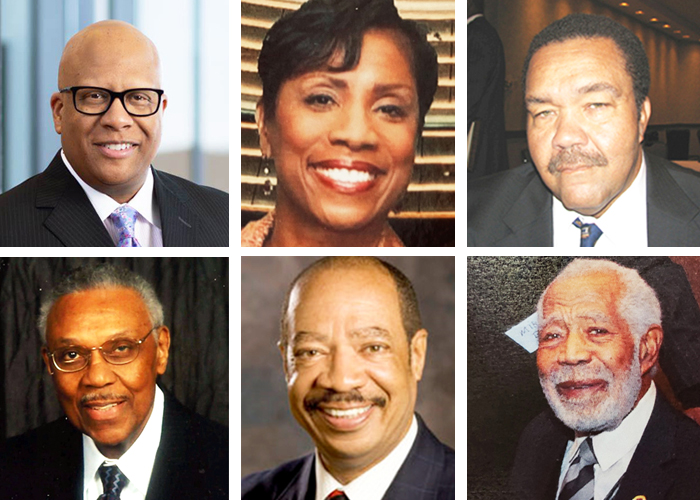The African American Legacy Project, under the guidance of founder and executive director Robert Smith will be celebrating its 20th anniversary with a Legends Celebration the weekend of October 11-12.
This year the AALP will be honoring six Toledo legends – Norman A. Bell Sr; Derrick R. Clay; Marsha Bonhart; John Rudley, PhD; David Delano Carter and John Marshall “Jack” Ford.
On Friday night, October 11, there will be a Hospitality Reception at 5:30 p.m. at the Renaissance Hotel in downtown Toledo. On Saturday, October 12, there will be a Legends Luncheon at 1:00 p.m. at The Pinnacle in Maumee.
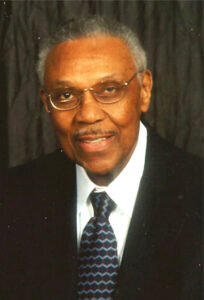
David Delano Carter
David Carter was a native of Newton, Georgia born in 1927. He was a musician and music educator with a long history of providing music education and music direction. He acquired a certificate from Bowling Green State University to teach music in the Toledo Public School System while also earning his Master of Education degree from the University of Toledo in 1974.
As an educator David Carter taught various subjects at Robinson Junior High School, Parkland Junior High School and Blessed Sacrament school.
Carter served as director of choral music at Scott High School in 1962. During his direction his Scott choirs improved the performance each year at the annual May Festival, performances of the Christmas and Easter portions of Handel’s Messiah taking top honors in the Ohio Choral music competitions.
In 1975, his Start High School Royal Choir represented the United States in a 23-day concert tour of Poland.
Carter also served in ministry directed choirs at Phillips Temple CME Church, Third Baptist Church, All Saints Episcopal Church, and St. Matthew’s Episcopal Church. Other endeavors included organizing the Afro-American Youth Choir and participating in the Kenneth Holland Chorus. He was a founding member of the Toledo Opera Chorus and directed the Mary Manse College choir, bass cantorial soloist at The Temple Shomer Emmunium, and bass soloist and section leader at St. Michael’s in the Hills for over 40 years.
His longest legacy has been the David Carter Symphonic Choir founded in 1985, first organized as the Scott High School Alumni Choir. This choir performed with the Toledo Symphony and Perrysburg Symphony Orchestras, Toledo Symphony Chorale and the Toledo Opera Chorus. Most notably, the choir commissioned and performed, MAKEDA Queen of Sheba.
David Carter’s family who shared his legacy upon his death in 2008 is his wife Isabelle, daughters Deborah and Shari and his grandchildren Connie and Phillip.
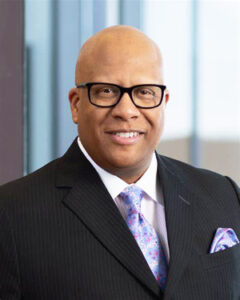
Derrick R. Clay
Visionary Leader.
Business Advocate.
Government Relations Expert.
Derrick R. Clay is a respected statewide business leader, experienced lobbyist, political strategist and community advocate with a strong background in government relations and economic development. He has worked with local, state, and federal leaders throughout the country to address legislative and regulatory concerns for clients in various industries.
His expertise lies in assisting clients with legislative and regulatory matters, leveraging his deep understanding of the political landscape to achieve their objectives. He has counseled several corporations and organizations such as Google, AT&T, Sherwin Williams and the Rock and Roll Hall of Fame, showcasing his versatility and business acumen. Derrick has also been involved in several high-profile development projects in Central Ohio. Additionally, he has served and led several high-profile boards in the Columbus region, further solidifying his commitment to the community.
Before joining Shumaker Advisors, Derrick served as chief executive officer of New Visions Group, a government relations and lobbying firm. His leadership and strategic guidance were instrumental in the firm’s growth and success eventually leading to its acquisition by Shumaker Advisors.
Throughout his career, Derrick has held leadership positions in both the public and private sectors. He served as Midwest Political Director for the Democratic Congressional Campaign Committee and Ohio State Director for the Gore Lieberman Presidential Campaign. He has received numerous awards for his work, including being named one of Ebony Magazine’s 30 Young Leaders of the Future.
Derrick’s commitment to excellence and passion for public service stem from his early days as student body president at the University of Akron. Nationally, he is a respected figure in the political arena, frequently sought after for his insights and analysis as a regular commentator on various political television programs.
Beyond his professional achievements, Derrick is a devoted family man and an avid golfer. He enjoys traveling, music and fashion.
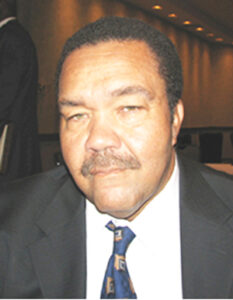
Jack Ford
By Fletcher Word
March 25, 2015
The first time I had the opportunity to sit down and have a lengthy, one-on one conversation with Jack Ford was in early 2002, several weeks after his inauguration as the City of Toledo’s first African-American mayor. The meeting was set up at his request, possibly because I was the only person in the media who had endorsed his bid for the position of Toledo’s chief executive.
We met in his office on Martin Luther King Day, a day on which the city was officially closed for business and the mayor was one of the only city employees at work. We spoke for about an hour on how he expected to handle business as he led the city for the next four years.
A little less than four years later, we sat down again in that office as we conducted his only exit interview in the wake of his re-election loss to Carty Finkbeiner. He was clearly upset that he had lost that election, losing elections didn’t happen often for Jack Ford. He was upset that his message and his administration’s accomplishments had not registered with the city’s voters but he voiced no regrets about those accomplishments.
“Our biggest challenge was to make the city a little more entrepreneurial in how it handles its budget … how the money comes in, how the money goes out,” the mayor replied when asked about how well four short years had gone.
“We invested in a tow lot which will bring in millions; we cut some longstanding practices such as unquestioned sick leave abuse; we tackled health care for the uninsured and there are now a little over 7,500 who are in CareNet or who have been placed into other existing programs; we tried to change things with respect to the longstanding insider network that tended to preclude a level playing field for minorities in city contracts; we listened to the citizens who indicated they wanted civility on the 22nd floor and we attempted to do that and, finally, we made great strides in working with the disabled community – curb repair, housing, ordinance on visibility, the first wheelchair accessible playground in northwest Ohio; we repaired more roads than any other mayor has and built more new homes as well.”
What he didn’t mention initially was his very early decision to get a smoking ban passed, without dissent, through City Council – the first such ban for a major Ohio city. It was a decision that, frankly, cut into revenues for some city businesses such as restaurants and bars. It was such an unpopular decision in so many quarters that it made his 2005 re-election loss a virtual certainty.
But Mayor Jack Ford never expressed any regret over the decision. “I would definitely do it again,” he said then. “I believe there will be people alive in 25 years that otherwise wouldn’t be.”
He may have paid a political price for that courage of conviction but Toledo’s smoking ban provided an example and cleared the path for other elected officials in Columbus and, later, in Lansing, MI to do the right thing and implement state-wide smoking bans.
And with that, Ford exited the political scene and attended his retirement party later in the week. Except, of course, he didn’t quite retire from the political scene, did he?
I got a call a couple of months after Jack left office and had moved on to other things such as teaching. He asked me if he could join The Truth as a political columnist. I thought long and hard about that, perhaps for as long as a millisecond, before saying “yeah, sure, absolutely, you betcha!”
For years, before he ran again for office, Jack handled the chores of dispensing invaluable political insight and wisdom to The Truth’s readers. He wrote about local, state and national politics from the viewpoint of an insider and, clearly, he was always an insider whether in or out of office.
“Tough times are ahead for the Midwest states of Michigan and Ohio,” wrote Jack in February 2007, a year and a half before the economy bottomed out. “The economic heart of these two industrial giants is being ripped out by global forces which cannot be ignored …”
Then Jack jumped back into politics with a flourish, running for the Toledo Board of Education, then City Council and even considering a run for state representative as an independent. His health struggles in recent years did not diminish his enthusiasm for playing a leadership role in this town and for pushing forward his favorite policy initiatives.
In the years to come, Jack’s legacy as a visionary trend-setter may or may not always be celebrated as much as his gruffness and obstinacy will be. But make no mistake, he was indeed blessed with the ability to see things as they should be. Along with Carty, well before either one became mayor, he revamped the city’s management and introduced the strong mayor concept and the city council structure as we know it today. When in the mayor’s office, along with the smoking ban, he brought CareNet into existence in order to insure the uninsured. That’s a policy that would later be adopted nationwide, of course.
Jack was always a relevant force and an important voice in his adopted home town – no matter which office he held and even when he was out of office. There aren’t enough buildings and streets in this town to name after him.
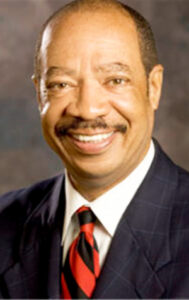
John M. Rudley, PhD, President Emeritus and Distinguished Professor of Business
John M. Rudley, PhD, served as the 11th president of Texas Southern University (TSU), one of the largest public historically black college and universities (HBCU) in the nation, which is located in Houston, Texas, the fourth largest metropolitan region in the country. Currently entering its 88th year, Texas Southern was designated as a “special purpose institution of higher education for urban programming” by the Sixty-third Texas Legislature in 1973.
During Rudley’s nearly eight-year tenure as President of Texas Southern University, he instituted substantive and far-reaching changes via administrative, academic, student and outreach initiatives. Rudley has overseen an increased Moody’s Bond Ratings for Texas Southern by three points; the creation of a singular collaboration with the Dynamo Soccer Team to partner in the newly opened $83 million BBVA Compass Stadium at a total cost of $1.5 million; administrative changes that led to clean financial audits for the years 2008-2014; and the launching of the University’s first Management Institute to prepare mid-level employees for future management positions.
Prior to joining Texas Southern University, Rudley served as Interim Chancellor of the University of Houston System and Interim President of the University of Houston, Texas’ premier public metropolitan research and teaching institution. He also served six years at that institution as vice chancellor/vice president for administration and finance.
Rudley has held numerous leadership positions in higher education, including vice chancellor for Business and Finance at the Tennessee Board of Regents, the sixth largest system of post secondary education in the nation. As Vice Chancellor, he promoted the effective and efficient financial operation of 46 postsecondary institutions consisting of 6 universities, 14 community colleges and 26 vocational-technology centers that served 185,500 students with a consolidated annual budget of $1.4 billion.
He also served with distinction at the highest level of education in the nation when he served as Special Assistant to the Secretary of the U.S. Department of Education, Secretary Lamar Alexander, in responding to the requirements of the Chief Financial Officer Act of 1990. Recommendations for organizational changes were developed, including the creation of an accounting and financial management services division and the completion of the first auditable financial report (in conjunction with the General Accounting Office) for the U.S. Department of Education, as well as plans for the consolidation of the Budget Formulation, Budget Execution and the Financial Management Services of the Department.
Earlier in his career, Rudley held administration and finance related positions in both Tennessee and Texas. He acquired his public accounting experience from Coopers and Lybrand in Los Angeles and Seattle.
Rudley is a licensed Certified Public Accountant. He received his Bachelor of Business Administration degree from the University of Toledo. He received his M. Ed in Administration and Supervision and his Ed. D in Administration from Tennessee State University.

Marsha Bonhart
Marsha Bonhart is a veteran of radio and television news, stemming from her days working in Toledo, Ohio, Dayton and Los Angeles. Retired as the director of media and public relations for Dayton Public Schools, she handles PR and media for local clients.
Marsha Bonhart was born in Toledo, Ohio. She graduated from Scott High School in 1969 and earned a degree in journalism from Ohio University. She started her career working in local television and radio stations in Toledo, Ohio and then moved Dayton, Ohio about 150 miles south in 1980 making it her new home.
In Dayton, Ohio she started as a weekend anchor and then quickly moved further down the path as a co-anchor (where she told the news during the week with another anchor). She then moved to Los Angeles, California where she was a health reporter and weekend anchor.
In 1988, Marsha returned to Dayton and worked at WDTN. She was an anchor and health reporter at the Dayton news station telling local stories for 27 years! She was often one of the few, or only black female anchors on screen giving a voice to those who may not always be represented.
Marsha received many awards and honors for her work as a journalist. She won the Ohio Public Images Award in 1993 and 2004 for producing stories about people with developmental disabilities. She was selected as one of the Dayton Daily News’ Ten Top Women in 2003 and has earned the YWCA Award for Personal Achievement and Community Involvement as well as “Top 15 Friends” award from Artemis Center for Alternatives to Domestic Violence. Her work was also nominated for an Emmy! An ‘Emmy Award’ honors the highest excellence in television.
In 2015 Marsha became the assistant vice president of public relations and programs at Wilberforce University, an HBCU ( or “historically black college”), in Ohio. After serving there she became the director of development at Dayton Contemporary Dance Company and then the director of public relations and media for Dayton Public Schools. Bonhart worked in many roles in the community and Dayton area using her gift to help tell stories!
Bonhart has been retired since 2020. She has two sons. She now serves as a Media and public relations consultant where she helps people achieve their goals.
Marsha started as a journalist in Toledo, Ohio and her career as a black female journalist lasted for almost 40 years! Marsha created paths that we all can follow – because she did – so can we!
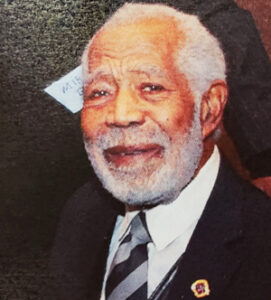
Norman Andrew Bell
Norman Andrew was born on October 4, 1932 in Baton Rouge. Son of Major Bell and Ernestine (Thomas) Lee. He earned a bachelor of science at Southern University in Baton Rouge in 1956 before moving to Toledo with his wife Ora.
Norman and Ora raised four boys: Michael P. (who became the Toledo’s fire chief and mayor), Keith M., Norman A., Shawn F.
Norman joined Supreme Liberty Life Insurance Company and, a year later, became a deputy recorder with Lucas County Court before joining the City of Toledo as a deputy bailiff in 1959.
Bell stayed with the City of Toledo. He became a conservation technician, a finance assistance manager, a chief equal employment officer, an executive director of the Board of Community Relations before joining the City’s Community Development department in 1974. Bell has been listed as a noteworthy municipal administrator by Marquis Who’s Who.
He earned a master’s of Education from the University of Toledo in 1976 and later, in 1988, did post graduate work at UT.
In addition to his municipal contributions, he has been a longstanding community leader, Norman Bell has been involved with a number of community associations over the years.
He has served on the board directors for Northwest Ohio Food Bank, Toledo, since 1988; the Neighborhood Improvement Association, Toledo, since 1988; the board of directors for Warren Sherman Development Corporation, Toledo; board of directors for Toledo Sister Cities.
He has been a member of National Association for the Advancement of Colored People (Second vice president since 1988, plaque 1979); American Civil Liberties Union (board directors Toledo chapter since 1988); American Society Personnel Administrators; Southern University Alumni Association; University of Toledo Alumni Association; Omega Psi Phi (Citizen of Year 1986, Silver certified, district area representative 1986).
Bell was also a founding board member The African American Legacy Project (2004),

